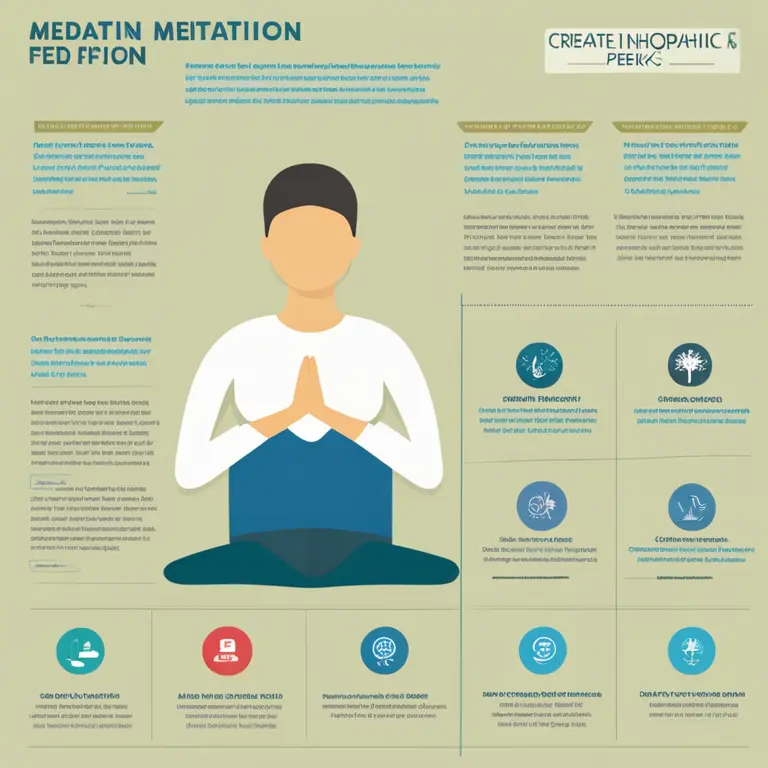
Meditation: Pathways to Inner Peace and Wellness
Discover the array of meditation techniques and their myriad benefits for mind, body, and spirit in today’s fast-paced world.
article by Hina Kurosawa
Introduction to Meditation
Meditation, an ancient practice that spans various cultures and religions, has evolved significantly to suit the modern lifestyle. Although meditation is rooted in spiritual disciplines, today it's widely embraced for its secular benefits. Meditation techniques vary, but they are unified by their attribute of mindfulness or focused attention aimed at achieving a state of mental clarity and emotional calmness. As we advance further into the 21st century, the principles of meditation are more relevant than ever for addressing the complex challenges of contemporary life.

The Spectrum of Techniques
Meditation practices are incredibly diverse, enabling individuals to find an approach that resonates personally. Mindfulness meditation encourages acute awareness of the present moment, often focusing on breath or bodily sensations. Transcendental meditation uses a mantra—a word or phrase repeated silently—to dive into deeper states of consciousness. Guided meditation, often accompanied by verbal instructions or music, helps the practitioner visualize positive scenes or journeys. Movement-based meditations, like tai chi and qigong, combine flowing actions with a meditative mindset. These varied options ensure that meditation remains accessible and adaptable for all.

Mental Health Advancements
The benefits of meditation are strongly supported by scientific research. Regular meditation is known to reduce stress, anxiety, and depression due to its impact on brain regions related to mood regulation. Studies from 2024 and beyond indicate that meditation can improve attention span, enhance neuroplasticity—the brain's ability to change and adapt—and lower cortisol levels, often referred to as the stress hormone. As our understanding of mental health grows, so does the realization that meditation can be a foundational tool for emotional and cognitive well-being.

Physical Health Perks
Meditation's positive effects are not limited to the mind. It's increasingly recognized for its ability to bolster physical health. Regular practitioners report lowered blood pressure, reduced chronic pain, and improved sleep. The relaxation response triggered by meditation can benefit the heart, immune system, and even cellular repair processes. With health systems around the globe emphasizing preventative care, meditation is quickly becoming a recommended practice to complement traditional medicine.
Enhanced Self-Awareness
A meditative practice can dramatically increase one's self-awareness, leading to greater personal growth and self-actualization. By sitting quietly with one's thoughts, individuals learn to observe their mental patterns without judgment. This heightened self-awareness can foster emotional intelligence and lead to better decision-making in life and relationships. In a world that often values action over introspection, meditation provides a space to reconnect with oneself on a deeper level.
Spiritual Connectivity
While meditation can certainly be practiced as a secular discipline, for many it remains a spiritual endeavor. Through meditation, individuals often report feeling a sense of oneness and connectivity with the universe. This can enhance personal belief systems and provide a sense of meaning and purpose. As society continues to grapple with existential questions, meditation offers a way to explore spirituality in a personal and self-directed manner.
Published: 2/12/2024
Modified: 2/12/2024
More predictions
Come back here soon to learn more about yourself and your future


Meditation: From Turmoil To Tranquility
James lived in the heart of the bustling city, surrounded by skyscrapers that seemed to touch the heavens and streets that never slept. Every morning, as the city roared to life, so did the storm inside James. A whirlwind of thoughts, worries, and fears that left him feeling trapped in his own mind. Deadlines, bills, relationship woes - the list seemed endless, and the weight of the world pressed heavily on his shoulders.


The Harmonic Resonance of Meditation Music
Delve into the serene world of meditation music and discover how it amplifies your spiritual and astrological practices, guiding you toward inner peace and cosmic synchronicity.


The Impact of Meditation
Delve into the heart of meditation and its profound impact on mind, body, and spirit in our fast-paced world.